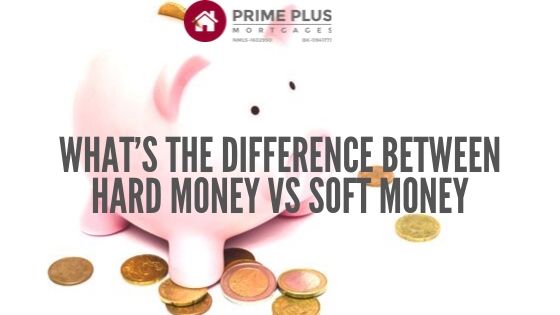
The perfect deal is hard to find, and so is the perfect loan for your real estate investment. All real estate investors need to know the difference between hard money and soft money to get the right funding.
Knowing the difference between hard money vs soft money is key to getting the best loans for your flip or rental.
Many first time investors have a hard time funding their investments. Picking the wrong loan can be costly. Choosing either Hard money vs soft money can make or break your profit.
Real estate investors looking to start funding their properties need to know the key difference between loans available. Below we break down the main differences between these types of loans, and which might suit your investment portfolio best.
What’s The Difference Between Hard Money vs Soft Money
Hard Money loans are a title or asset-based loan, who base the value of a loan in the real estate property. This is a major change from bank loans or soft money loans who are credit-based. Asset-based loans are secured by real estate and the value of the loan is tied to that property.
Hard money lenders, place the value and amount of the loan using the after repair value to determine the maximum worth of your investment.
The ARV of a property is determined by a few factors, such as comparable properties, upgrades, and current sales of similar properties. Traditional mortgages do not budget for repairs but instead focuses on the buyer’s ability to pay back the loan. This involves lengthy credit checks, income verifications and mountains of paperwork that can take weeks to approve.
Bank loans do have an advantage to homeowners, as they offer lower rates and long payback periods. For House Flippers though, or even those managing rentals, hard money can be a deal saver, for their shorter terms (under 12 months) and easy funding process.
Ways To Use Hard Money vs Soft Money Loans
Hard money lenders offer special loans for real estate investors for their ideal investments. These loans can vary from fix and flip loans, bridge loans, home rehab loans, and short sale loans. They offer these loans quickly and easily to investors, who need to close quickly.
In these cases, hard money loans work better for real estate investors than soft loans.
Hard money loans offer investors easy ways to fund the tricky areas they face in real estate investing. Home Rehab loans can be used for budgeting big one time repairs before listing or renting a property.
Fix and Flip loans are ideal for investors looking to purchase, improve a property and sell for a profit. Bridge Loans make refinancing tricky loans at high rates easier by offering temporary relief and funding.
Soft money loans can help purchase a home, but not repair it, or is scrutinized in the application process. Refinancing can kill your credit.
Banks may offer repair loans but long applications can take too long and offer too little. Real estate investors may prefer hard money over their soft loans counterparts.
How investors plan to use their Hard money vs soft money loans determines the best loan for them.
Hard Money vs Soft Money Rates
Hard Money Loans are not for those seeking traditional mortgages for their homes. Homeowners will be offered better rates and terms than those seeking hard money for their home.
Hard money loans are created for real estate investors, looking to fund short-term investments. A big difference between these two is in the rates and terms. A traditional bank mortgage rate can fall anywhere between 3.9-4.7 percent over a 30 year period.
A hard money loan rate is anywhere between 10-15% over the course of 12 months. Hard money loans are structured for investors to purchase, repair and sell the property.
Therefore, bank loans will have lower rates and longer terms than hard money loan counterparts.
How To Apply
While banks have been offering different ways to apply for mortgages, no need to sit down with an agent in a brick and mortar building anymore!
The application process moves and moves online a big issue separates the two of them.
For Real estate investors, the speed of the application, and the speed of approval is still key. Applying for a hard money loan is easy, as it only requires the property information, so an application can take as little as two minutes.
Traditional loans, however, require proof of employment, income, credit histories and scores. It is a time-consuming and lengthy process.
It can take weeks to get approved for a traditional loan! With a hard money, loan can take as little as 12 hours to be approved, and you can get funded within 24 hours!
 Finding Your Lender
Finding Your Lender
Hard Money lenders can be found all over Arizona, as well as traditional lenders.
While Traditional lenders will leave you waiting, a hard money lender will help you fund your property now!
Prime Plus Mortgages is a hard money lender who creates hard money loans for real estate investors, like you. We will help you use the loan as effectively as possible because we are real estate lenders too.
Prime Plus Mortgages will help you budget and plan for your investment, so you can make the most ROI as possible.
Having quick access to funding is essential, which is why investors choose Hard Money vs Soft Money.
Simply Put, hard money loans are lifesavers for real estate investors!
Summary
There are many differences between hard money vs soft money loans. For real estate investors looking to fund their property, choosing the right loan is vital to their success.
The Difference Between Hard Money vs Soft Money Loans Are:
- How To Qualify: Hard money loans use asset values, while soft money uses the borrower’s credit.
- Ways to Use: From fix and flips, rentals, short sales, hard money is flexible and perfect for investments. Soft money can offer a wide variety but take longer to process and approve.
- Rates: Soft money rates are lower, and for longer terms than hard money. Soft money is ideal for homeowners.
- Finding A Lender: Applying for your hard money loan is easy with a virtual application. Soft money loans may require going to an office to talk to a bank and take longer to approve.





 Finding Your Lender
Finding Your Lender
